I'd been in
Abkhazia for a week and I was getting bored. I'd come looking for an adventure
but instead I had been seduced by the warm waters of the Black Sea and the
excellent Abkhaz wine which I had been drinking liberally since I'd arrived.
I'd always liked the idea of a traditional beach holiday, set in beautiful
surroundings but with the backdrop of a war zone.
The juxtaposition of leisure and horror intrigued me. However as I
had soon realised after crossing the Ingur bridge into Abkhazia, this small country
only lived up to half of the bargain. It was stunning, a naturalist’s paradise
but the terror was over, I could sleep safely. And whilst that was a good thing
for the local population who had witnessed enough horror, selfishly, I was a
little disappointed.
I was in the southern town of Ochamchire, a town
that privileged Soviets had flocked to in great numbers before the fall to
relax on its pebble beach and soak up the southern sun. But the days of
Ochamchire's beaches being full of holidaying apparatchiks and their families
were but a distant memory. Now the town was a sleepy backwater that had few
visitors and a wrecked tourist infrastructure. An abandoned hotel stood at one
end of the beach and looked out over a beautiful shore line that now had more
cows strolling along it then holidaymakers.
Ochamchire is a town where every
street is a reminder to the war and the ethnic cleansing that took place there.
As the victorious Abkhaz fighters backed by the Russian army pushed the
Georgian army out across the Ingur river back into Georgia the ethnic Georgian
population who had lived in Abkhazia for generations followed them carrying
what they could and leaving what they could not. They were the lucky ones. The
stragglers and the brave were rounded up and herded into Ochamchire's football
stadium from where women and children were systematically raped and the men
were killed. Streets of empty houses the only reminder to their presence in the
country and the genocide committed against them. I'd asked people in
the town how they felt about the fact that the neighbours that they had grown
up with sharing their vines and wells had been allowed to be so cruelly
treated. Was there a sense of common shame? Few were willing to utter more than
a few words on the matter. History may well be written by the victors but they
seem less inclined to speak.
My map showed a solitary road heading deep into
the Caucus mountains beginning in Ochamchire and ending at the town
of Tkvarcheli, in the mountains some 30 kilometers away. With no idea as
to what I would find there but with no better options I flagged down a passing
taxi. A battered Volga pulled up driven by a silver haired Abkhazian man. Levar, as he introduced himself, was confused by my request. "Why don't I take you
to Novi Afon instead, the scenery there is more beautiful." He was
reluctant to take me to Tkvarcheli insisting I'd not like the place. I
increased my offer to 1500 Roubles, a foolishly high sum for such a short
journey and reluctantly he asked me to get in. We left Ochamchire, passing
through streets and neighbourhoods where nine tenths of the houses were
abandoned and burnt out, the Georgian quarter. As we drove on into the
foothills of the Caucus mountains the more suspicious Levar became of my intentions
there. "What do you want to go to Tkvarcheli for?" he pressed. I'd
already explained that I just wanted to have a wander around, I was bored of
the beach, but that raised his suspicions further, "They will think you
are a spy and arrest you," he said looking at me without a hint of humour.
"Well then they'll shoot you for collaborating with the
enemy," I said teasing. We drove on in silence.
As the road climbed out of the foothills and
into the mountains the temperature dropped. We drove into a patch of fog but
when we appeared through the other side we did so into a landscape of verdant
hills, rushing mountain streams and the occasional abandoned building. It was a
stunningly beautiful place. It was also more Soviet then the coast, the
signposts, the hammer and sickle motifs on buildings, there had not been such a
rush to eradicate the reminders to the past. It was also noticeably
poorer. Abkhazian people had been wonderfully friendly on my trip. This
trip to the Caucuses, my first, had been an epiphany for me. For years I had
associated the Russian language and all who spoke it with an unsmiling solemnness.
But here in the Caucuses for the first time I saw the Russian language used by
races who used the language as an instrument to convey happiness. People smiled
at strangers, they said dobri-den whilst passing on the street. It was nothing
short of shocking to walk into a shop to be welcomed by smiling faces speaking
Russian (Russian is the lingua franca of Abkhazia and the Caucus region) and
not to be made to feel as though you were a nuisance. Yet here in the mountains
on the road to Tkvarcheli there were no smiles. As we passed half abandoned
villages people watched us pass, but seemingly with suspicion etched on their
faces. It seemed outsiders didn't come this way much. The road was empty
without any other vehicles on it save the occasional army truck loaded with
Russian conscripts. I'd heard nothing but resentment towards the Russian
military presence in Abkhazia. Shortly after crossing the border into Abkhazia
a week earlier the marshrutka I had been travelling in had been stopped at an
army road block manned by Russian soldiers. All the passengers and I were
ordered outside for a documentation inspection. The Abkhazian passengers were
seething that they were being stopped and inspected by Russians in their own
country. It was plain to see where the real power lay in Abkhazia and the
locals resented it.
We drove on in silence and passed a sign
announcing our entry into the Tkvarcheli region, Lavar the driver turned to me
and reminded me that I should be careful. Rounding a corner the view of
Tkvarcheli opened up in front of us. It was not a pretty sight. In a mist
shrouded valley lay the lower half of the town, the industrial area, the coal
mine, the now abandoned railway station, some disused factories with
their decaying towers and some Stalinist buildings long abandoned and beyond
repair. And up higher on the upper slopes of the mountain side lay the centre
of the town, the worker's quarters and all that was necessary for life.
Stretched out high above the town and linking both halves, the upper and the
lower, were steel cables holding a couple of now disused cable cars, stranded
midway between the wheel houses, no doubt used to transfer the workers from the
upper half of the town down to the mine. It was a scene unlike any I had ever
seen on my FSU travels before. An ugly town, run down and decaying but
paradoxically set in such lush and beautiful surroundings.
I asked Levar to park up by the railway station
that stood at the entrance to the lower half of the town. I switched on my
camera, "Don't let anybody see you," Levar instructed tetchily. I
entered the collapsing terminal building built in the classical style Soviet
architects of the early period were instructed to build. It had not been used
for years but once had train services to Sukhumi and beyond. I walked along the
overgrown platform, nobody in sight, the lower half of the town was dead. As I
walked to the end I saw Levar hiding behind a wall watching me. Did he suspect
me of being a spy or was he just looking out for me? In Ochamchire I had been
complacent about being in a conflict area, but up here in Tkvarcheli with Levar
and his warnings about me being arrested or being seen things felt different. A
strange feeling was growing inside me, one I did not recognise. We returned to
the car, Levar wanted to return to Ochamchire but I insisted we drive on.
We passed derelict factory buildings until
coming to a traffic circle which marked the entrance to the upper part of the
town. It was surrounded on three sides by Stalinist apartment buildings,
solidly built but long abandoned. The street was empty except for two guys
loading a large sack into the back of a Lada. They stopped and eyed us suspiciously
before dumping the sack in the trunk of the car and driving off. We parked up
next to a fast flowing river and I got out. "If you see someone hide your
camera and act normal," Lavar instructed. I ran across the open space in
the centre of the road and into an over grown and disused park which
had a dilapidated fountain and beyond that a shell of an apartment building.
It
was rare to see housing of such quality in the former Soviet Union. These
buildings were built with quality materials and built to last. They had not
collapsed, but had been stripped of their wood. Window frames, roof lintels,
floor joists. They'd been needed perhaps in the cold winter months of the war.
I'd seen plenty of Krushevkas in states of disrepair but these were different, this
was not worker's housing. I walked through the park following the cracked
cement pathway. It was deserted, the only sound being that of the river running
through the centre of town. I returned to the car.
We crossed the river and
climbed higher into the upper town. There was no sign of modernity, nothing to
suggest we were in the new millennium. The streets were empty except for
the occasional Soviet built car and glum looking pedestrian who stood and
watched as we drove past. There were a few shops built into the bottom of
Stalinist apartment buildings which had painted wooden signs advertising what
they stocked 'Shoes', 'Products', 'Bread'. It was like a film set. We pulled up
at an abandoned theatre, outside were some workmen taking a rest from painting
a building on the opposite side of the road. I entered the theatre through a
broken door in the lobby whilst undoing my zip, better they think I was
urinating on their theatre then photographing it. Its rooms had the detritus of
the towns past cultural life; a rotting cupboard of costumes, discarded
celluloid film reels, a ballet shoe hanging on a nail.
The auditorium was a jumble of rotting leather chairs. How had it
come to this? Was the squalor in the town the result of the war, or the result
of a collapsing economy that was no longer spoon fed on subsidies?
We drove on
passing more glum pedestrians shuffling along semi deserted streets. At the
time of the last great Soviet census in 1989 the population of the town stood
at 22,000. Twenty years on it is less than 5000. People had left the town at
the first opportunity. Why? Levar turned to me as we drove, "Who are
you?" he asked, my previous explanation that I was just a tourist had
obviously not convinced him. "Really, who are you?" I'd never had
that question put to me before and for a moment I was unsure as to what he
meant, but what he meant was what was I doing up here in the mountains of
Abkhazia in some hell hole photographing everything that everybody else ceased
caring about 20 years ago? It was a good question, one I had no real answer to,
but in his mind he knew the answer. I either really was a spy or more likely,
an idiot. People wanted to escape this town yet I'd sought it out despite his
best efforts to steer me away. Why was I not in Novy Afon with the other
tourists?
Everything in the town was so imposing, hewn
from grey rock, built to survive the winters. During
the independence war in the early 90's Georgian forces had besieged
Tkvarcheli and tried starving the town into submission. The town's population
had held out for over 400 days until Abkhaz forces with Russian help had
relieved the town. It was a town built to endure, physically and mentally. We
took another road that led to a plateau high above the town and came to an
abandoned restaurant overlooking a bend in the river. It was a beautiful
setting; the town planners had chosen their spot well. The restaurant was built
on a raised plinth with a glass front that opened up the view to the distant
snow-capped mountains, up here with nobody watching Levar relaxed a little. He
went to the trunk of his car and pulled out a bottle of sickly sweet Abkhaz
wine and a dirty plastic mug. "This place was a fine restaurant, you
needed connections to get a table. I heard Beria ate here". We both sat in
silence and drank the sickly sweet wine gazing out at the view. Talk of Beria
and the images that his name conjured up brought back the feelings of unease
I'd felt since entering this town. As we finished the last of the wine Levar
asked if I wanted to see anything else but I'd seen enough and did not like
what I had seen.
I'd visited run down towns all over the former
Soviet Union in search of reminders of the near past but this place was
different. The difference was that in other towns and cities there had been
small reminders to the past in a sea of steadily growing modernity, a krushevka
building surrounded by glass office buildings, a crumbling Soviet bus stop
mural plastered with posters for an Ace of Base concert, an abandoned fishing
boat. They were subtle reminders of the late Soviet period. There were of
course two Soviet Unions: Pre-Stalin's death and post. Post-1953 was Yuri
Gagarin and Sputnik, it was Glasnost and the Moscow Olympics, it was Alla
Pugachova pop songs and Tarkovsky films, it was Kvass dispensers and
Cheburashka cartoons. It was a familiar place that on the surface at least was
not too different to our own countries. I could have found a place for myself
in that world. Tkvarcheli was not of that world. Tkvarcheli was built in the
early 1940's,a nastier more vicious period. And it did not just offer a glimpse
into that time; it seemingly still inhabited it.
The abandoned apartment
buildings on the traffic circle overlooking the only road into the town were
too well built to have been built for the workers; instead they were built for
the nomenclature of the Stalinist period: party cadres and their
families, securitat men, directors of the factories. And nobody achieved those
positions in those dark days without having blood on their hands, without
handing over a list of names, without reporting to someone. Nobody got to
live in the well-built apartment overlooking the park in Tkvarcheli unless they
were able to mute the voice of their conscience and do
certain despicable things. Up there looking out of their apartment
windows they would have seen all who came and went into the town, making mental
notes. The coal mine, the life blood of the town would have been mined by the
hands of prisoners, people torn from their homes and dumped here. Nobody would
have come to this damp valley unless it was through force or instruction. The
town was built to supply coal to the Soviet industrial machine; quotas would
have to be filled with dire consequences for ones that were not met. And how
did those prisoners arrive in the town? They walked along the very platform I'd
walked on at the railway station earlier. The abandoned restaurant I was
sitting in had not been not for the town's folk to enjoy but for the ruling
elite and that meant people implicit in crimes. The cold stares, the paranoia,
the constant watching as we drove past – it was too real. I'd always wondered
how it would have been to have lived in the Soviet Union in the height of Stalin's paranoiac reign
where nobody was to be trusted, where you were watched and spied upon by your
closest neighbours and family. Where there were certain buildings you dared not
walk past because of the horrors contained within. Now for the first time in my
travels I felt the faint touch of its tentacles, the first sting of fear and
despair. Tkvarcheli was a cruel place, sodomised by its own collusion with
history. Lavar sensed it and had tried to warn me without verbalising the fact.
And now I had come to sense it too. Tkvarcheli was a concrete testament of
man's inhumanity to man.
We drove back from the restaurant along the half
deserted streets passing the more Stalinist buildings. A man in a suit ran out
of a building towards us shouting in a language I did not know, Levar
accelerated past him. I watched him in the wing mirror as he pointed at our car
whilst frantically shouting at a passersby. I turned to look at Levar for an
explanation but he was staring ahead,jaw tensed in the direction of the road
out of town. I was glad to be heading there with him.

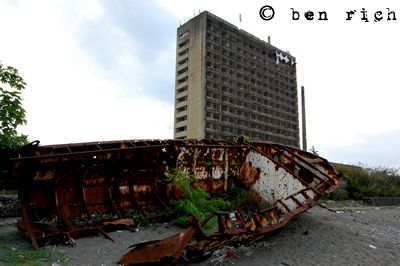
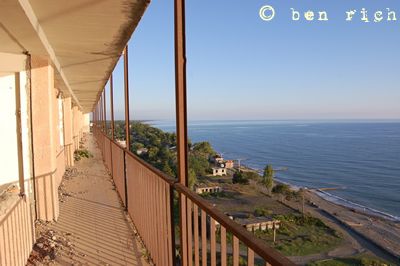
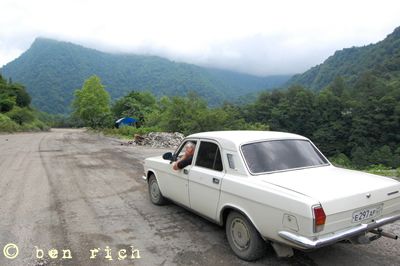
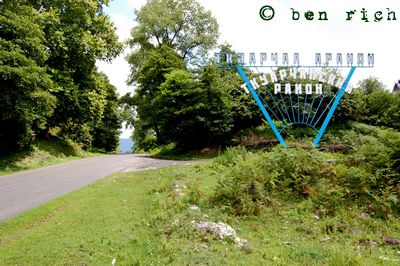
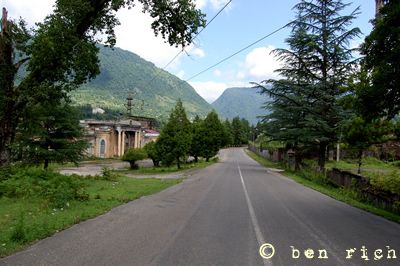
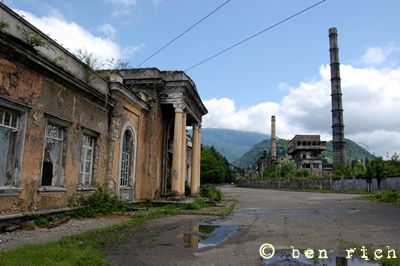
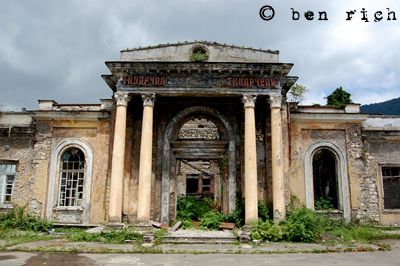
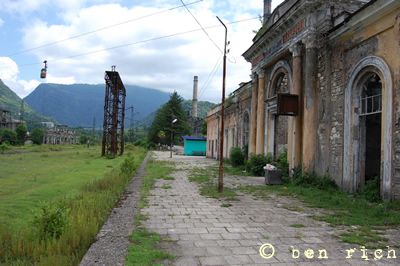
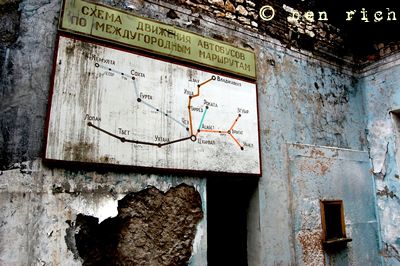
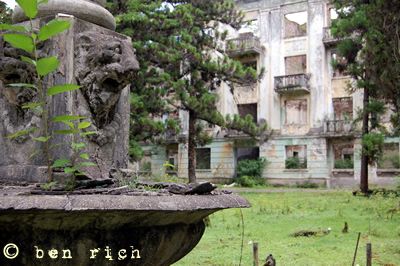
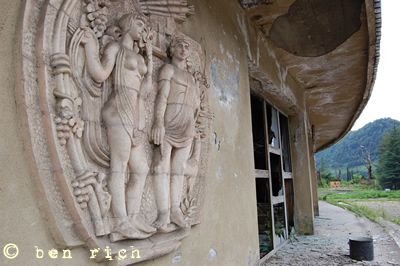
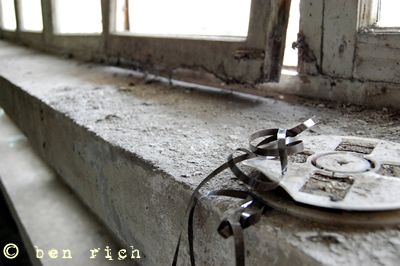
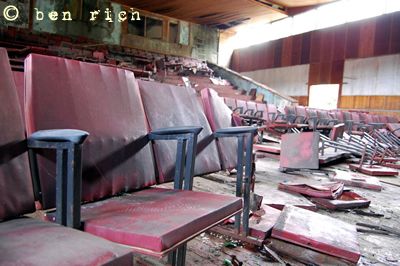
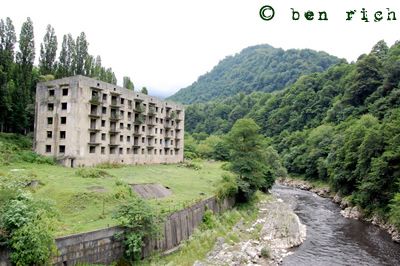
Fantastic narrative.
ReplyDeleteThrough memory we travel against time, through forgetfulness we follow its course.
ReplyDeleteFlights to kinshasa
Cheap Flights to kinshasa
Cheap Air Tickets to kinshasa
Finding flights is a mammoth task however have you ever wondered how the airlines decide which price to charge you? this article shows exactly how the airline industry operates and could also save you hundreds on your flight tickets no matter where or when you are traveling.
ReplyDeleteair charter
Fascinating journey! So what did you finally answer to your guide's "who are you?" Questions?
ReplyDeleteNice info.. thanks for sharing .
ReplyDeletemyanmar tourism
a light view form past places
ReplyDeleteairport parking gatwick
Gatwick airport parking